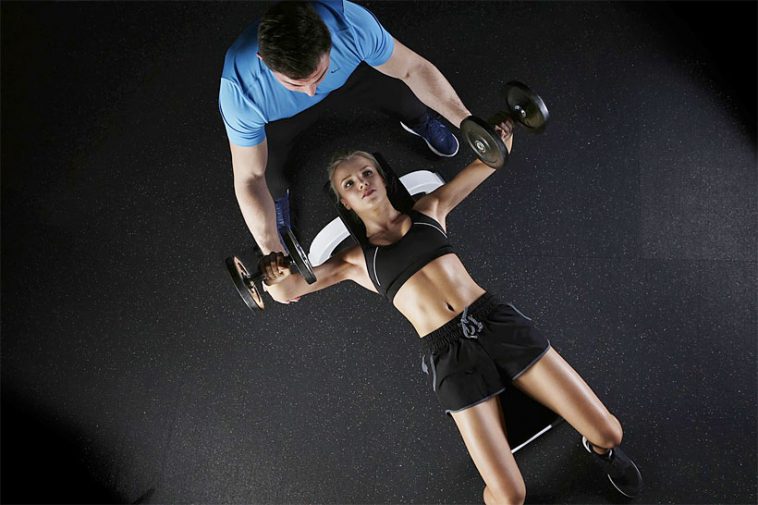- Like
- SHARE
- Digg
- Del
- Tumblr
- VKontakte
- Flattr
- Buffer
- Love This
- Save
- Odnoklassniki
- Meneame
- Blogger
- Amazon
- Yahoo Mail
- Gmail
- AOL
- Newsvine
- HackerNews
- Evernote
- MySpace
- Mail.ru
- Viadeo
- Line
- Comments
- Yummly
- SMS
- Viber
- Telegram
- JOIN
- Skype
- Facebook Messenger
- Kakao
- LiveJournal
- Yammer
- Edgar
- Fintel
- Mix
- Instapaper
- Copy Link
Introduction
 When you get down to it, a fitness trainer is only as effective as the communication between them and their client.
When you get down to it, a fitness trainer is only as effective as the communication between them and their client.
What many people fail to realize is that they have to communicate with their trainer about things that go well beyond their gym routine. Everything from your sleep habits to your stress levels to your diet will impact your fitness results.
And while your trainer isn’t your therapist or a nutritionist (unless your trainer is very well-versed), they do need to know when something might affect your training.
And knowing what to share is only the first hurdle. You must then figure out which details your trainer needs and the best way to communicate them. Thankfully—when it comes to diet at least—this is all relatively straightforward.
Dietary Problems That Your Trainer Needs to Know About
There are a few key pieces of dietary information that your trainer needs to know. They need to know when you eat, what you eat, and any issues you’re having with your appetite or energy levels.
Most trainers will ask for this information at the start of your training. You just have to be sure and update them if things change.
How you should go about that varies from topic to topic, and they’re all covered below.
Problem 1: Lack of Energy
A good workout will leave you feeling a little tired. That much is unavoidable.
But if you’re exhausted all day long—with or without a workout—you might want to talk to your trainer.
The first thing they’ll want to know is how much sleep you’re getting, so make sure you address that issue first. If you’re getting enough sleep and still feel like you’re lagging behind, then you need to bring it up at your next training session. It is helpful to note
Start off by telling your trainer that you’re already getting enough sleep. That will help move the conversation past an obvious—and ineffective, in your case—solution.
Once that is out of the way, you’ll want to have at least a general idea about what you eat and how much of it you’re eating. Diets low in any one core food group—fats, protein, or carbs—can lead to fatigue if they’re not carried out properly.
Your trainer may suggest a number of dietary changes designed to boost your energy. Just be sure and let them know any restrictions you have before you take their advice to heart.
Some of their tips may have to be adjusted based on your individual needs, and most trainers are more than happy to tailor their suggestions to each client. For example, if you tend to overindulge in alcohol, your trainer might recommend you cut back or find a more health substitute.
Problem 2: When You Eat
Even if you’re eating the right things, you might not be eating them at the right time.
Eating too soon before a workout means that your body doesn’t have time to process the food into energy. Eating too early, on the other hand, means that your body might burn through the energy before you even get to the gym.
Most trainers are equipped to help you set up an eating schedule. It is most effective if they are also a dietitian or nutritionist, but even trainers focused solely on exercise know a few good scheduling options based on their other clients, as well as their own needs.
Just like with your energy levels, however, this can get a little sticky if you are trying to work on a very specific eating schedule. Intermittent fasting is currently very popular and is an excellent example of this.
Your trainer can help you determine if you’re making any of the common intermittent fasting mistakes.
Your trainer should also be able to help you work out when your “eating window” should take place, but they need some specific information to make that happen. They’ll need to know other commitments you are working around, such as work or class schedules. They will also need to know if other people share your meal times, such as your partner or your children.
Trainers use this information to make sure that your eating schedule works for your life. Everyone has a slightly different schedule, particularly when it comes to work and classes.
In order to fix this particular dietary problem, you and your trainer will have to make sure your choices work with your life as a whole, not just the time you spend at the gym.
Problem 3: What You Eat
Food is a sensitive topic for a lot of people. You may wonder whether you’re eating too much or not enough. You could be one of those people who is game to ‘eat anything,’ or you might be a ‘picky eater.’
There doesn’t seem to be any one right answer. That makes talking to your trainer about your daily menu that much harder.
The important thing to remember is that your trainer is not there to judge you. You’re paying them to help you reach a fitness goal. While they might be a little frustrated if you’re burning it up at the gym and reaching for junk food at home, it isn’t their job to shame you.
By and large, most trainers know this. They would much rather you talk to them about your eating habits than lie or hide them.
Trainers do their best work for you when you’re honest about where you’re coming from.
Good trainers can even help you set new habits. It will take time, and you won’t always remember to skip the ice cream after dinner or reduce the number of empty carbs on your plate… but being honest with someone who is invested in helping you make positive, healthy changes is a good way to support new habits.
An easy way to get the information into your trainer’s hands without feeling like you’re going to confession is to keep a food log. Start simple and just write down what you eat and when you eat it.
“2 pancakes, 2 eggs, 3 strips bacon, coffee with milk and sugar at 8 am” is a solid entry for breakfast. It tells your trainer what you ate and when you ate it.
The key is to start out with the basics and grow from there. You don’t need to measure every little thing and report it back to your trainer.
However, a simple food log will give you something to look over together. And, as you change your habits, you can look back and see the way the changes slowly spread through your daily diet.
The Takeaway
When it comes down to it, the first step to bringing up dietary problems with your trainer is pinpointing what the problem is.
They can help you do that, of course, but things will go faster if you walk in with at least a general idea of where you’re struggling.
That, coupled with basic information on your current diet, will help your trainer give you the best advice. At the end of the day, all of it is meant to help you reach your goals—not some unattainable idea of perfection.
You are striving for a goal that you set for yourself, and in the end, that goal and your health are what matter most.
About Shannon Clark
Shannon holds a degree in Exercise Science and is a certified personal trainer and fitness writer with over 10 years of industry experience.

